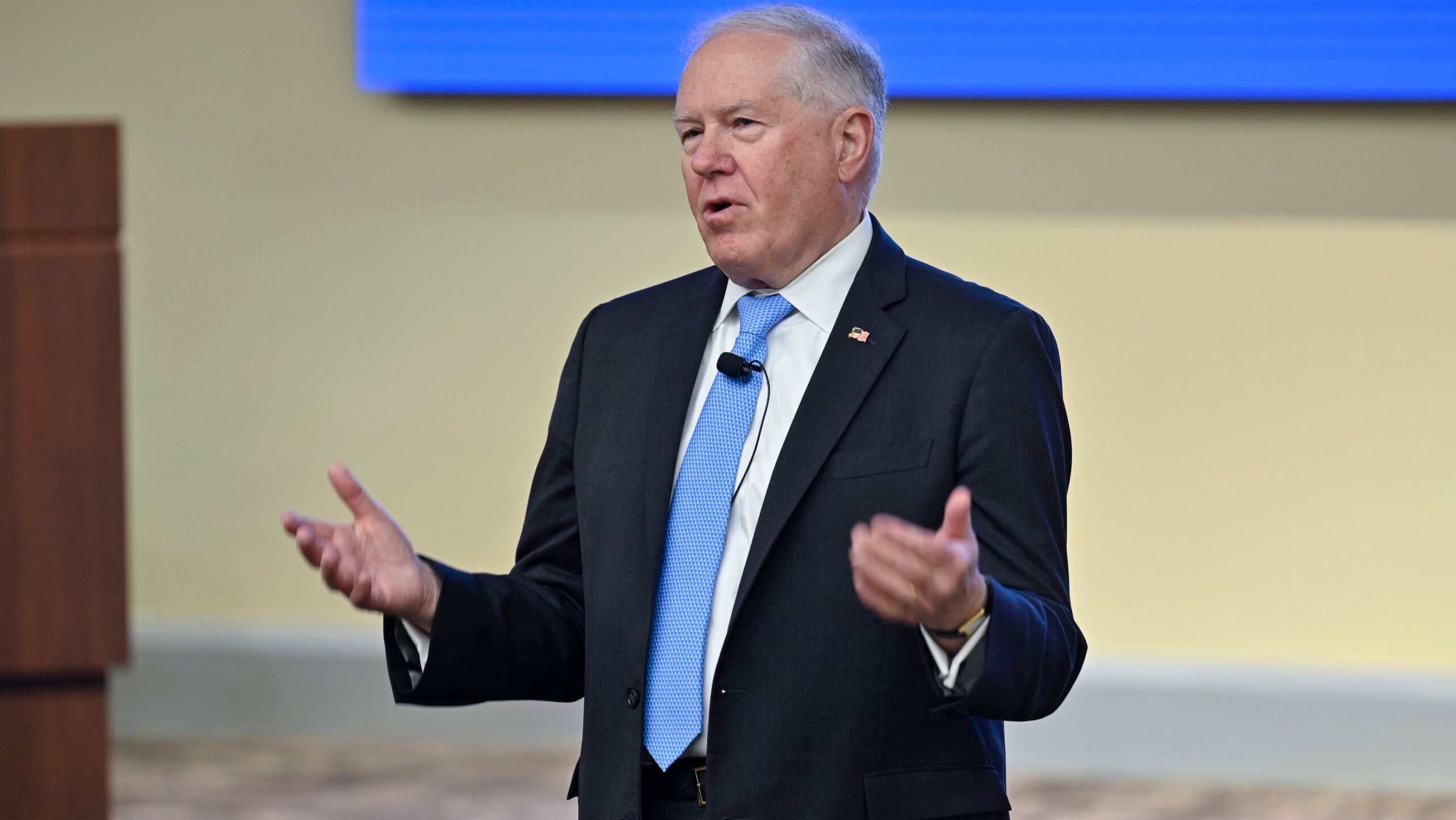
Secretary of the Air Force Frank Kendall speaks with students and guests during the Senior Leader Orientation Course at Joint Base Andrews, Md., July 24, 2023. The course provides training for newly selected brigadier generals and senior executive service members. (U.S. Air Force photo by Eric Dietrich)
WASHINGTON — A visibly incensed Air Force Secretary Frank Kendall took lawmakers to task Thursday for failing to pass a budget for the 2024 fiscal year, and alongside the Pentagon’s top weapons buyer, warned that Congress is giving away time to the Defense Department’s pacing challenge of China.
Since October, the federal government has been operating under a continuing resolution (CR) in lieu of a new budget, freezing spending for agencies like the Pentagon at FY23 levels. The problem is particularly frustrating for Kendall, whose first tranche of funds to finance his key initiatives, known as operational imperatives, came in the FY24 budget to the tune of about $5 billion, according to the secretary.
“I have been waiting for a year now since we submitted that budget for the Congress to appropriate it,” Kendall said during a discussion hosted by the RAND Corp. on reforming the Pentagon’s cumbersome budget process. “There is a chance that Congress will never appropriate the ’24 budget. And I will have been in office for three-and-a-half years and never seen a dime of the money I need to be competitive with China. That’s a crime.”
Under Secretary of Defense for Acquisition and Sustainment Bill LaPlante during the RAND panel described the situation like running a race, but having to take a knee “25 percent of the time” — a rough approximation for how long the government typically operates with a CR in a given fiscal year.
“This is just crazy. It’s absolutely crazy,” LaPlante said. “And everybody says it, everybody says they know it, but it’s a real problem.”
Even though congressional leaders have reportedly agreed on toplines for the FY24 budget, a deal is still not in sight, and a 1 percent cut to FY23 levels will automatically be enforced if lawmakers can’t strike an agreement by the end of April. Pentagon leaders have emphasized that areas like troop pay will be fenced off from those cuts, meaning accounts like research and procurement will likely bear the brunt of the sequestration.
RELATED: CCA loyal wingman could lose ‘a year’ of progress due to congressional budget logjam: Kendall
The Department of the Air Force already had to make “hard choices” in the FY25 budget to align with a debt ceiling agreement last year that capped FY25 defense spending at $895 billion, Kendall said. Should the CR stretch on and the sequestration take effect, the FY25 proposal — expected to be released early next month — “will not be highly relevant to our reality. And we will have to go back and make some changes,” he said.
Despite the budget dysfunction, lawmakers did grant Kendall one reprieve in approving a pared down version of his “quick start” initiative, which he explained in an exclusive op-ed for Breaking Defense would allow the Pentagon to begin new programs without congressional approval so long as work is limited to early design activities. That step was a “breakthrough,” Kendall said, which the Air Force is now using to propose kicking off a “major new start.” Kendall said he couldn’t reveal it, reasoning LaPlante, seated next to him, had not yet been briefed.
PPBE Preview
Elsewhere during the panel discussion on reforming the Pentagon’s Planning, Programming, Budgeting & Execution (PPBE) process, PPBE Reform Commission Chair Bob Hale and Commission Executive Director Lara Sayer previewed some of the changes expected in the commission’s final report that will be released next month.
The commission, which released an interim report in August, will likely recommend stronger budget guidance to the military services, Hale said, adding that it will “build off” Kendall’s work by recommending that the Pentagon both be given some authorities to make changes to existing programs and start new ones with “strict limits designed to preserve congressional oversight.”
Hale noted that some within Congress and the Pentagon might resist changes being explored by the commission, though after the event he told Breaking Defense that after working closely with the Hill throughout the process, he was optimistic at least some of the commission’s recommendations would be realized.
“I think we’ve got a shot for some of them,” he said. “First, we’ve got to get DoD on board. And then DoD has got to try to sell these things to Congress.”
Sayer, who noted during the discussion that frequent in-person communication is probably one of the best steps DoD can take immediately to improve the budgeting process, also told Breaking Defense she was bullish on the commission’s work.
“I think if [lawmakers] see DoD leaning forward to make their own internal changes that they’ll be willing to get on board too,” she said.
Senator raises defense industry concerns over Boeing’s potential Spirit buy
Sen. Jerry Moran, R-Kan., says defense primes need more clarity about what happens to their programs if Boeing buys Spirit.


























